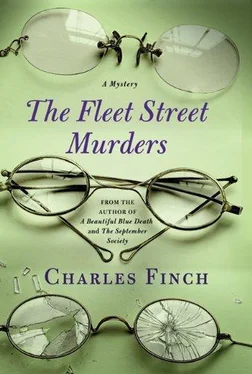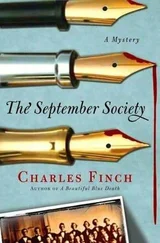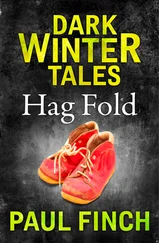Charles Finch - Fleet Street murders
Здесь есть возможность читать онлайн «Charles Finch - Fleet Street murders» весь текст электронной книги совершенно бесплатно (целиком полную версию без сокращений). В некоторых случаях можно слушать аудио, скачать через торрент в формате fb2 и присутствует краткое содержание. Жанр: Исторический детектив, на английском языке. Описание произведения, (предисловие) а так же отзывы посетителей доступны на портале библиотеки ЛибКат.
- Название:Fleet Street murders
- Автор:
- Жанр:
- Год:неизвестен
- ISBN:нет данных
- Рейтинг книги:5 / 5. Голосов: 1
-
Избранное:Добавить в избранное
- Отзывы:
-
Ваша оценка:
- 100
- 1
- 2
- 3
- 4
- 5
Fleet Street murders: краткое содержание, описание и аннотация
Предлагаем к чтению аннотацию, описание, краткое содержание или предисловие (зависит от того, что написал сам автор книги «Fleet Street murders»). Если вы не нашли необходимую информацию о книге — напишите в комментариях, мы постараемся отыскать её.
Fleet Street murders — читать онлайн бесплатно полную книгу (весь текст) целиком
Ниже представлен текст книги, разбитый по страницам. Система сохранения места последней прочитанной страницы, позволяет с удобством читать онлайн бесплатно книгу «Fleet Street murders», без необходимости каждый раз заново искать на чём Вы остановились. Поставьте закладку, и сможете в любой момент перейти на страницу, на которой закончили чтение.
Интервал:
Закладка:
“Yes, sir, it seems plausible when you put it so.”
“Is there another way to put it that I haven’t thought of?”
“I have one question, sir,” said Graham.
“Yes?”
“Why do you believe Carruthers was the real target? Is it not just as likely that Pierce was the real target and Carruthers the cover-up?”
“I don’t think so. Pierce was incorruptible and untainted, and Carruthers was utterly corruptible, utterly tainted. There’s something more important, though.”
“Yes?”
“The piece of paper missing from the desk in front of Carruthers. Do you remember I told you that he had ink all over his hands and a pen, but that there was no paper before him? I reckon Carruthers was blackmailing somebody, writing something incriminating-he was killed for that missing piece of paper.”
“Whereas Pierce died on his doorstep, and the killer never could have gone inside,” murmured Graham thoughtfully.
“Precisely. I feel sure we’re right. Please go see Dallington when we get back and tell him that I think Poole is innocent. Fetch him to me then, would you? I haven’t the patience to wait for a note to find him.”
“Very good, sir.”
“What’s all this?” said Edmund, stirring.
“Gerald Poole is innocent,” said Lenox, eyes blazing.
Edmund blinked. “How long was I asleep?”
CHAPTER THIRTY-FOUR
They arrived in London in late evening, and the station discharged the three men, a ragged procession laden with bags, into a thick, cold rain. Lenox grabbed the first newspaper he could lay his hands on and read the opening line of its lead article, on the subject of Exeter’s death: “A lion has vanished from the halls of Scotland Yard, and our nation’s capital is inestimably poorer for it.” All of the news stories about Exeter ran in that way, and by the time his carriage had reached Berkeley Square Lenox was persuaded that the man might as well have been Alexander the Great, such was the tenor of the tributes to him. It gave him a queer feeling, to imagine poor Exeter dead; it can never be pleasant to mourn for someone that you’ve had equivocal feelings about.
When they reached Hampden Lane and Lenox’s house, Graham handed the luggage to a footman and then was instantly off in a cab to find Dallington. The two brothers, meawhile, dragged their tired bodies into the library.
“Welcome back,” said Mary in the hallway, curtsying. “Coffee?”
“Wine,” said Edmund.
“Whisky,” said Lenox.
The fire was warm and made him drowsy, and Lenox felt a sluggish pleasure at being home after the dual calamities of Exeter and Stirrington.
“Thanks for coming up to Stirrington,” he said to Edmund. “I was so awfully low. It saved me.”
“Of course,” murmured Edmund.
There were a few long minutes of silence, during which Lenox assumed they were both ruminating on the past day or two. It came as something of a surprise, then, when Edmund’s head rolled back a little and he gave a great snore.
Lenox laughed quietly and pulled the wineglass from his brother’s hand. Then he crept out to the hallway and said to Mary, “Leave the library alone, would you, and have someone make up a fire in the Ugly Room.”
Now, in Lenox’s house the Ugly Room was rather an institution; it was situated toward the back of the first floor and had a few small windows overlooking the thin strip of garden behind the house. It took its name not from its situation, which was in fact rather pleasant, but from its contents. They were the debris of Lenox’s life. There was a giant, hideous wardrobe that he had somehow convinced himself to buy when he came to London, a large oil painting that he had bought from a friend’s exhibition and couldn’t get rid of, a pair of ornate silver candlesticks that stood about two feet high and looked as if they had come from somebody’s nightmare. Bad books lined the walls. Sooner or later every uncomfortable and creaky chair in the house found its way to the Ugly Room. Lenox went back there to wait for Dallington and surveyed it with some satisfaction. Most people had their terrible things spread throughout their house, but he liked to concentrate them all in one place, where he could make sure they never moved back into his life on the sly. He didn’t come in here more than once a fortnight.
Soon Dallington and Graham had returned, and the former came in to sit with Lenox, who had been reading.
“How do you do?” said the detective when Graham was gone again.
“Why have we been evicted from the library?” He squirmed. “I feel as though this chair bears a personal grudge against me.”
Lenox laughed. “My brother fell asleep in there. Sorry.”
“What’s all the cloak and dagger, then? Graham pulled me out of a decent game of whist.”
“That’s probably for the best,” said Lenox. He couldn’t help himself from lecturing his apprentice now and then.
“Yes, yes, and I should only drink barley water and meditate on the Sabbath. Still, it’s damn hard to find a game of cards in this town!”
“I think Poole is innocent.”
Dallington furrowed his brow. “Well, of course.”
“You say that despite his confession?”
With that the younger man looked uneasy. “Well-”
“I have a theory that Poole is the victim of a plan to frame him for the murders of Pierce and Carruthers.”
“So do I-Hiram Smalls asked him for a meeting.”
“That relies on Poole’s word, you know. Let me tell you what I think.”
Lenox repeated what he had said to Graham-that Carruthers was the murderer’s real target and Pierce an unfortunate casualty, the murderer having known that the two men were connected by Poole and that Gerald Poole was in London again.
Dallington whistled, impressed. “Could well be,” he said. “So they may not be the Fleet Street murders after all, then.”
“Precisely-we can’t quite say what sort of murders they may be, except that with Exeter and Smalls dead, too, they’re for very high stakes.”
“Speaking of which-shall you be safe?”
“I hope so,” said Lenox. “I don’t speak to the papers, so I hope it’s not widely known that I’ve interested myself in this business. Still, I mean to speak to Scotland Yard about it tomorrow. They may give me assistance.”
“There’s such a public outcry over Exeter, I’m sure they’ll be desperate to do anything to find his killer.”
“Yes,” said Lenox grimly. “God, but it’s an ugly thing.”
“What can I do?”
“Find out why Gerald Poole confessed.”
Dallington stared at Lenox for a moment and then nodded. “All right,” he said. “I’ll see him first thing in the morning.”
“I’ll see you tomorrow, then?”
“Yes-I’ll come here when I’m done.”
“I may be out during the day, but wait, if you would.”
“Of course.”
Dallington left then, perhaps off for a few more rounds of whist to brace him for his morning task, and Lenox checked on his brother-still sound asleep. Molly and their sons were in the country, and he decided to let Edmund rest.
“Put him upstairs, would you, if he should stir?” he said to Graham. “Tell him I won’t hear of him going home.”
“Very good, sir.”
Then at last, blessedly, he could go see Jane.
He fairly bounded next door, hoping it wasn’t too late to catch her. Her telegram had been brief but consoling, and he felt a powerful desire to see her, to remind himself that he had a wonderful life, well worth living, even without Parliament.
Her house, imperiously tall from across the street, seemed from their own sidewalk to be no more than a homely, silent thing, with one room dimly lit and all the others entirely dark. Before he could knock she opened the door and, without speaking, wrapped him in her arms. For a moment he remembered how it had been when his mother was alive, even into his thirties-that childlike comfort she was able to give him long past the age of scraped knees.
Читать дальшеИнтервал:
Закладка:
Похожие книги на «Fleet Street murders»
Представляем Вашему вниманию похожие книги на «Fleet Street murders» списком для выбора. Мы отобрали схожую по названию и смыслу литературу в надежде предоставить читателям больше вариантов отыскать новые, интересные, ещё непрочитанные произведения.
Обсуждение, отзывы о книге «Fleet Street murders» и просто собственные мнения читателей. Оставьте ваши комментарии, напишите, что Вы думаете о произведении, его смысле или главных героях. Укажите что конкретно понравилось, а что нет, и почему Вы так считаете.












